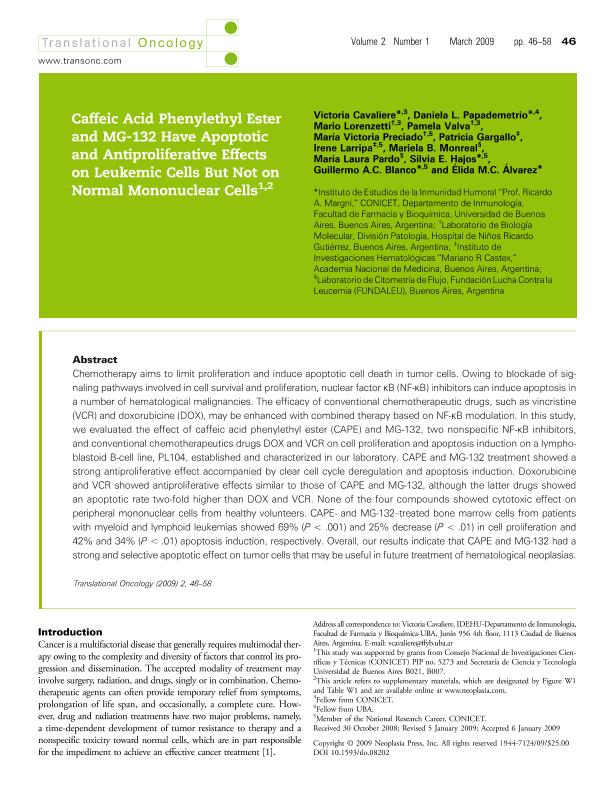Artículo
Caffeic acid phenylethyl ester and MG-132 have apoptopic and antiproliferative effects on leukemic cells but not on normal mononuclear cells
Cavaliere, Victoria ; Papademetrio, Daniela Laura
; Papademetrio, Daniela Laura ; Lorenzetti, Mario Alejandro
; Lorenzetti, Mario Alejandro ; Valva, Pamela
; Valva, Pamela ; Preciado, María Victoria
; Preciado, María Victoria ; Gargallo, Patricia Martha; Larripa, Irene Beatriz
; Gargallo, Patricia Martha; Larripa, Irene Beatriz ; Monreal, Mariela B.; Pardo, Maria Laura
; Monreal, Mariela B.; Pardo, Maria Laura ; Hajos, Silvia Elvira
; Hajos, Silvia Elvira ; Blanco, Guillermo Armando C.
; Blanco, Guillermo Armando C. ; Alvarez Carbonetto, Elida M. del C.
; Alvarez Carbonetto, Elida M. del C.
 ; Papademetrio, Daniela Laura
; Papademetrio, Daniela Laura ; Lorenzetti, Mario Alejandro
; Lorenzetti, Mario Alejandro ; Valva, Pamela
; Valva, Pamela ; Preciado, María Victoria
; Preciado, María Victoria ; Gargallo, Patricia Martha; Larripa, Irene Beatriz
; Gargallo, Patricia Martha; Larripa, Irene Beatriz ; Monreal, Mariela B.; Pardo, Maria Laura
; Monreal, Mariela B.; Pardo, Maria Laura ; Hajos, Silvia Elvira
; Hajos, Silvia Elvira ; Blanco, Guillermo Armando C.
; Blanco, Guillermo Armando C. ; Alvarez Carbonetto, Elida M. del C.
; Alvarez Carbonetto, Elida M. del C.
Fecha de publicación:
03/2009
Editorial:
Neoplasia Press
Revista:
Translational Oncology
ISSN:
1936-5233
Idioma:
Inglés
Tipo de recurso:
Artículo publicado
Clasificación temática:
Resumen
Chemotherapy aims to limit proliferation and induce apoptotic cell death in tumor cells. Owing to blockade of signaling pathways involved in cell survival and proliferation, nuclear factor κB (NF-κB) inhibitors can induce apoptosis in a number of hematological malignancies. The efficacy of conventional chemotherapeutic drugs, such as vincristine (VCR) and doxorubicine (DOX), may be enhanced with combined therapy based on NF-κB modulation. In this study, we evaluated the effect of caffeic acid phenylethyl ester (CAPE) and MG-132, two nonspecific NF-κB inhibitors, and conventional chemotherapeutics drugs DOX and VCR on cell proliferation and apoptosis induction on a lymphoblastoid B-cell line, PL104, established and characterized in our laboratory. CAPE and MG-132 treatment showed a strong antiproliferative effect accompanied by clear cell cycle deregulation and apoptosis induction. Doxorubicine and VCR showed antiproliferative effects similar to those of CAPE and MG-132, although the latter drugs showed an apoptotic rate two-fold higher than DOX and VCR. None of the four compounds showed cytotoxic effect on peripheral mononuclear cells from healthy volunteers. CAPE- and MG-132-treated bone marrow cells from patients with myeloid and lymphoid leukemias showed 69% (P < .001) and 25% decrease (P < .01) in cell proliferation and 42% and 34% (P < .01) apoptosis induction, respectively. Overall, our results indicate that CAPE and MG-132 had a strong and selective apoptotic effect on tumor cells thatmay be useful in future treatment of hematological neoplasias. Copyright © 2009 Neoplasia Press, Inc. All rights reserved.
Palabras clave:
Caffeic Acid Phenyethyl Ester
,
Mg-132
,
Apoptosis
,
Leukemic Cells
Archivos asociados
Licencia
Identificadores
Colecciones
Articulos(IMEX)
Articulos de INST.DE MEDICINA EXPERIMENTAL
Articulos de INST.DE MEDICINA EXPERIMENTAL
Articulos(SEDE CENTRAL)
Articulos de SEDE CENTRAL
Articulos de SEDE CENTRAL
Citación
Cavaliere, Victoria; Papademetrio, Daniela Laura; Lorenzetti, Mario Alejandro; Valva, Pamela; Preciado, María Victoria; et al.; Caffeic acid phenylethyl ester and MG-132 have apoptopic and antiproliferative effects on leukemic cells but not on normal mononuclear cells; Neoplasia Press; Translational Oncology; 2; 1; 3-2009; 46-58
Compartir
Altmétricas



